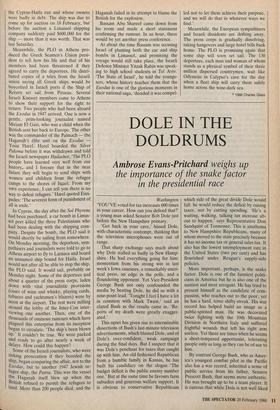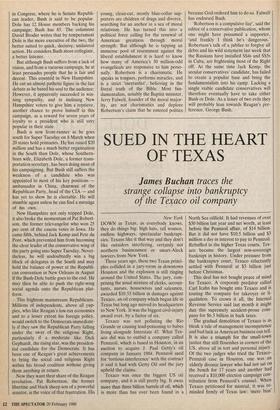DOLE IN THE DOLDRUMS
Ambrose Evans-Pritchard weighs up
the importance of the snake factor in the presidential race
Washington `YOU'VE voted for tax increases 600 times in your career. How can you defend that?' a young man asked Senator Bob Dole just before the New Hampshire primary.
`Get back in your cave,' hissed Dole, with characteristic contempt, thinking that the television microphones were out of range.
That sharp exchange says much about why Dole stalled so badly in New Hamp- shire. He had everything going for him: momentum from his strong win in last week's Iowa caucuses, a remarkably uncri- tical press, an edge in the polls, and a floundering opponent. Yet Vice-President GeOrge Bush not only confounded the media by beating Dole, he did so with a nine-point lead."Tonight I feel I have a lot in common with Mark Twain,' said an elated Bush as the results came in. 'Re- ports of my death were greatly exagger- ated.'
This upset has given rise to interminable dissections of Bush's last-minute television advertisements, which blasted Dole, and of Dole's over-confident, weak campaign during the final days. But I suspect that it was Dole's penchant for taxes that caught up with him. An old fashioned Republican from a humble family in Kansas, he has built his candidacy on the slogan 'The budget deficit is the public enemy number one.' But at the same time he favours farm subsidies and generous welfare support. It is obvious to conservative Republicans which side of the great divide Dole would fall: he would reduce the deficit by raising taxes, not by cutting spending. 'He's a waiting, walking, talking tax increase ab- out to happen,' says Representative Don Sundquist of Tennessee. This is anathema to New Hampshire Republicans, many of whom moved to the state precisely because it has no income tax or general sales tax. It also has the lowest unemployment rate in the United States (two per cent) and has flourished under Reagan's supply-side policies.
More important, perhaps, is the snake factor. Dole is one of the funniest politi- cians in America but he is also one of the nastiest and most arrogant. He has tried to present himself as the candidate of com- passion, who reaches out to the poor, yet he has a hard, tense shifty streak. His war record has helped build an image as a public-spirited man. He was decorated twice fighting with the 10th Mountain Division in Northern Italy and suffered frightful wounds that left his right arm useless. Yet there are times when he seems a short-tempered opportunist, tolerating people only as long as they can be of use to him.
By contrast George Bush, who as Amer- ica's yoUngest combat pilot in the Pacific also has a war record, inherited a sense of public service from his father, Senator Prescott Bush, that seems more authentic.
He was brought up to be a team player. It is curious that while Dole is not well liked in Congress, where he is Senate Republi- can leader, Bush is said to be popular. Dole has 12 House members backing his campaign; Bush has 85. The columnist David Broder writes that by temperament Dole is the more executive of the two, the better suited to quick, decisive,' unilateral action. He considers Budi more collegiate, a better listener.
But although Bush suffers from a lack of vision, and from a vacuous campaign, he at least persuades people that he is fair and decent. This counted in New Hampshire. He cut an almost pathetic figure in the last debate as he bared his soul to the audience: However, it apparently succeeded in win- ning sympathy, and in inclining New Hampshire voters to give him a reprieve, another chance to prove himself in this campaign, as a reward for seven years of loyalty to a president who is still very popular in their state.
Bush is now front-runner as he goes south for Super Tuesday on 8 March when 20 states hold primaries. He has raised $20 million and has a much better organisation in the South than Dole, whose Southern- born wife, Elizabeth Dole, a former trans- portation secretary, has been doing most of his campaigning. But Bush still suffers the weakness of a candidate who was appointed to most of his key positions — ambassador in China, chairman of the Republican Party, head of the CIA — and has yet to show he is electable. He will stumble again unless he can find a message of his own.
New Hampshire not only tripped Dole, it also broke the momentum of Pat Robert- son, the former televangelist who won 25 per cent of the caucus votes in Iowa. He came fifth, behind Jack Kemp and Pete du Pont, which prevented him from becoming the clear leader of the conservative wing of the party going into Super Tuesday. Never- theless, he will undoubtedly win a big block of delegates in the South and may hold the balance of power at the Republi- can convention in New Orleans in August if the Bush-Dole battle goes to the end. He may then be able to push the right-wing social agenda onto the Republican plat- form.
This frightens mainstream Republicans. Millions of independents, above all yup- pies, who like Reagan's low-tax economics and to a lesser extent his foreign policy, would switch to the Democrats immediate- ly if they saw the Republican Party falling under the sway of the religious Right, particularly if a moderate like Dick Gephardt, the rising star, was the presiden- tial candidate for the Democrats. It has been one of Reagan's great achievements to bring the social and religious Right within his broad coalition without giving them anything in return.
Now they want their share of the Reagan revolution. Pat Robertson, the former libertine and black sheep son of a powerful senator, is the voice of that frustration. His young, clean-cut, mostly blue-collar sup- porters are children of drugs and divorce, searching for an anchor in a sea of moral relativism. He has turned this into a political force calling for the renewal of American greatness through moral strength. ' But although he is tapping an immense pool of resentment against the liberal establishment it is hard to know how many of America'§ 50 million-odd evangelicals are responsive to him perso- nally. Robertson is a charismatic. He speaks in tongues, performs miracles, and is a strict inerrantist, believing in the literal truth of the Bible. Most fun- damentalists, notably the Baptist minister, Jerry Falwell, founder of the moral major- ity, are not charismatics and deplore Robertson's claim that he entered politics because God ordered him to do so. Falwell has endorsed Bush.
`Robertson is a compulsive liar', said the editor of a conservative publication, whom one might have presumed a supporter, `and frankly I think he's dangerous.' Robertson's talk of a , jubilee to forgive all debts and his wild statement last week that the Russians have installed SS4s and SS5s in Cuba, are frightening most of the Right off. At the same time Jack Kemp, the secular conservatives' candidate, has failed to create a populist base and bring the fundamentalists into his camp. Lacking a single viable candidate conservatives will therefore eventually have to take either Bush or Dole. As a lesser of two evils they will probably lean towards Reagan's pre- ference, George Bush.



















































 Previous page
Previous page